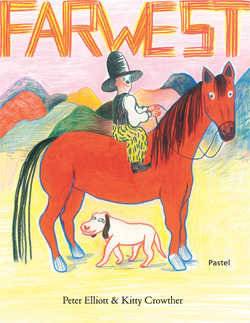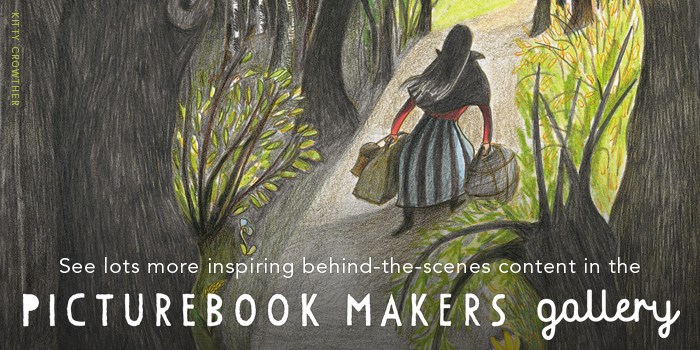< Back to posts
Peter Elliott & Kitty Crowther
Belgium
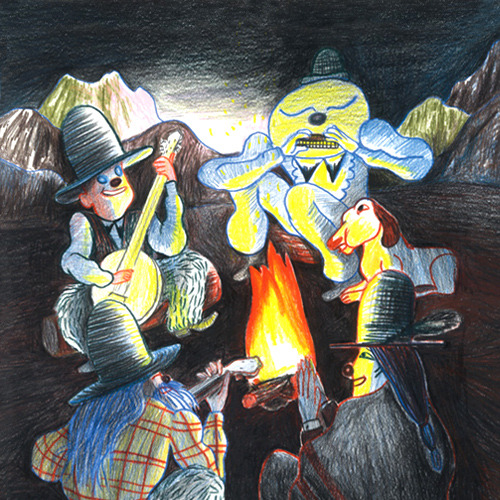
Peter Elliott is an illustrator, author and musician. He’s worked on over twenty books with Pastel–l’école des loisirs and has released several albums with his band, Busty Duck. Kitty Crowther is one of the most celebrated picturebook artists working today. In 2010, she received the prestigious Astrid Lindgren Memorial Award.
In this post, Peter and Kitty talk about their collaboration on ‘FARWEST’ – a wildly original picturebook which is based on an old French expression. First published in French by Pastel–l’école des loisirs, there are more foreign editions to come.
Visit Peter Elliott’s website
Visit Kitty Crowther’s Instagram page
Peter: Since I was a kid, I’ve been a musician. I write songs. And since childhood, I’ve received a great deal of pleasure from drawing. So I carried on as a musician and became an illustrator, and then later, an author.
I wrote FARWEST as I write lyrics for a song. It always starts with a simple idea. In this case, it was the French expression, ‘qui va à la chasse perd sa place’ (why this expression, I don’t know). The literal English translation is ‘he who goes hunting loses his place’, though I think ‘move your feet, lose your seat’ works better in English.
I simply asked myself what would happen for real if somebody leaves their place and another one takes it…
I thought it would be nice to welcome the guy back anyway, like:
“Hey dude, take a seat; you’re welcome!”
Very quickly, I realised this is a perfect way to meet people. And I love to meet people. So… Thinking of all this, I let the rhythm of the words lead the game. I wanted to make the text sound like music.
And finally (the same night) I made sketches for the illustrations. At that moment, I was making the book on my own.
A few days later, I sent ‘Qui va à la chasse’ to Kitty (only the text, not my sketches). I wanted to know her opinion on what I wrote and if she thought it was good enough to present to Odile, our publisher at Pastel.
Kitty and I have known each other for a long time. We were at the same art school, Saint Luc in Brussels, and we’ve shared the same publisher for over twenty years.
Also, I’d seen Kitty dancing back when I was playing live with my band, Busty Duck. This is the reason why I asked her to illustrate the cover of our album ‘Zoomorphic’ in 2009 (our third and final album; the band isn’t together anymore).
I think that Kitty and I have a particular relationship to music. Maybe this is why she felt the rhythm in my text so strongly.
I was really surprised when Kitty asked me if I was okay to let her illustrate the story. I replied: “you’re welcome!” And Kitty decided to do the story with cowboys and to name it FARWEST.
During the making of the book, Kitty and I were with our publisher Odile at Kitty’s house, to see the sketches for FARWEST. It was amazing to discover how my words had been interpreted by Kitty’s brain. How her imagination had devoured the story.
On that day, I met this magnificent red horse and Jonas, a funny dog who is the link between the humans. I also saw this sketchbook page with Jeff, Jim and Koko playing music around a fire:
Odile and Kitty suggested that I compose the music from that picture. Kitty illustrated my words with pictures, and now I could illustrate Kitty’s picture with music. I loved the idea!
A few days later, my father gave me a tenor banjo. That night, I sat on the floor of my workroom, which is also where I record my songs. I lit a candle (my fire), played a few chords and I started to sing. With the lyrics, I wanted to talk about refugees and all the lost people. And to claim that the only possible answer is “welcome.”
Today, I just can’t believe how beautiful the book is. And I’m dazzled by the strength and the truth that I feel in Kitty’s pictures – just as I was back at art school, when I first saw her work pinned to the wall of the studio.
FARWEST.
I wrote a story.
Kitty made a world of it.
Kitty: It’s nice to be back on Picturebook Makers. Thank you for inviting us to talk about this wild, crazy cowboy book. I am super-proud of it.
As Peter mentioned, we have known each other for a long time. We often write to each other. I’ve always loved the way Peter writes his emails and I encouraged him to write novels. So one day, he asked me to read one of his texts and tell him what I thought. I fell for it. I loved the rhythm.
He sent it in March 2015, so thank you for your patience, Peter!
When I read a text, I must be able to see the pictures in my head. It has to take me on a journey; I have to travel. And it has to be very different from what I do with my own books. I love writing; I always feel it’s a different muscle that’s working. And I think that one lifetime won’t be enough to write all the stories that I want to tell. So, I’m not usually keen to illustrate other people’s words, even if they’re nice. With FARWEST, I didn’t say yes to please Peter, but because I believe very strongly in this story. I need a lot of freedom and Peter knows this.
I thought it would be too obvious to have ‘Qui va à la chasse perd sa place’ as the title, and Peter agreed to change it to FARWEST. I’m a big fan of Tarantino, old Westerns, trappers, wildlife, Jack London, Calamity Jane, Billy the Kid, and all the others. And now the Westworld TV series.
In this book, there’s an accumulation of people. And it can be read on different levels (I hope).
You could see it as an immigration story. Or the fear of losing your seat. I remember as a child, it was always hard for me to find my seat. To find my place.
During the recent American election, I felt sick. So much hate. So much lack of wisdom. Hardly any empathy. All my bones were hurting, thinking of my ancestors invading America all those years ago. The descendants of those people. Hunger for gold and land. Escaping misery.
Millions of Native Americans died. Pushed out from their lands. Killed or consumed by illness. They were treated the worst way you could imagine.
I recommend reading the beautiful words of Russell Means, a Native American activist and actor (1939-2012): ‘If You’ve Forgotten the Names of Clouds, You’ve Lost Your Way: An Introduction to American Indian Thought and Philosophy’.
It’s frightening that we hardly take care of nature’s guardian tribe. We just create eager people. More is never enough.
The story of FARWEST starts on the title page. A Native American, drawn in charcoal, sitting on his horse. Beside him is his dog. It’s a black and white page, like this would have happened a long time ago.
(I asked Peter to add a horse and a dog. It amused me so much to see this supposedly loyal dog changing master all the time!)
So, you have to create the link between the title page and the following page. I’ve always been fascinated by the passing of time in books. Page one and page two; what happens in-between?
You have three characters at the start of the story. Two white people and one Native American. It made me smile to draw the Native American with a costume – almost like he would be more educated than the other two. Playing with visual language.
I wanted to draw big landscapes. I think it’s very good for your spirit to see far into the distance. It opens your brain up to possibilities.
I had to choose the person who replaces the little hero of the book when he goes out hunting. It was hard to find this person. An African boy? A Native American boy? A Chinese boy? A girl?
Then I was looking at this incredible animation film from Max Fleischer…
I am totally fascinated by how Koko the Clown moves and dances. Such beautiful art!
Anyway, inspired by Koko, this yellow guy showed up.
My Koko has an emoji face, or smiley. People all around the world use them.

With the way he’s dressed, Koko seems to come from the music hall.
Peter insisted on no guns in this book. You think of cowboys and you see guns. But when you see the situation with gun laws in the USA, it’s really frightening. It’s easier to buy a gun than to publish an edgy book for children. Ha! Guns are like drugs/tobacco/alcohol/petrol/human trafficking and all the rest, just to feed the appetite of angry-black-suited greedy men and women (I’m sure these are shortcut thoughts, but hey!).
The next character who arrives is a woman. Rosa Parks.
For the ones who don’t know her, she is a famous African-American civil rights activist. She sat at the front of a bus where African-American people were forbidden to sit at that time. She refused to give up her seat. Very brave her.
With the next ‘names’ that arrived in the story, we tried to find people who work/worked for freedom and humanity.
So there’s Russell Means (read about him earlier in this post).
Then there’s Elizabeth Cochrane Seaman (1864–1922; her pen name was Nellie Bly). She was known for her pioneering journalism, including her 1887 exposé on the conditions of asylum patients at Blackwell’s Island in New York, and her report of her 72-day trip around the world.
Patti Smith. Because she is such a beautiful punk.
Martin Luther King. Because he had a dream.
Calamity Jane. The letters to her daughter – even though it was later discovered that they weren’t really written by Calamity Jane – are amazing.
Django from the Tarantino film, based on the legendary African-American Marshall, Bass Reeves.
I love it that the sweet cowboy says: “At the end of the day, I may have lost my seat, but there’s still plenty of space.”
(You might have noticed that all the characters in FARWEST have something in common: their nose! Little round black noses, like Micky Mouse or in Picsou magazine, the Beagle Boys or Felix the Cat. It made me smile to do this.)
Okay, to finish, I’d like to talk a little bit about the animation I made for Peter’s song (see the video earlier in the post).
Peter suggested we use the picture of the gang singing and playing music, and that we could make the fire move…
But I was afraid we would get bored after a while.
I really love animated GIFs – hypnotic ones, like the bison by Eadweard Muybridge.
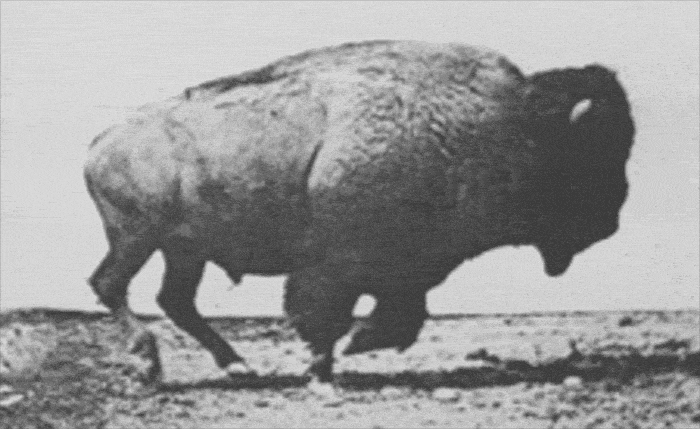
Muybridge was an English photographer. I recently discovered that he emigrated to the USA in 1850. And in 1868, his large photographs of Yosemite Valley made him world-famous!
But Muybridge is best known for his pioneering work on animal locomotion in 1877 and 1878. A few years before this, a French physiologist and inventor called Étienne-Jules Marey wrote that a galloping horse had all four hooves off the ground for a brief moment, and that the way horses were depicted in some paintings was wrong. I always find it fascinating when art mixes with science and discovery.
Through his pioneering work, Muybridge proved that Marey was right. So thank you to Mr Muybridge (even if it’s said that he killed the lover of his wife and was never punished). And thank you, Monsieur Marey. Because I think that the horse is one of the hardest things to draw, and I always wanted to try to understand it. In fact, horses run on their nails!
With my animation, I wanted to make it as easy as possible to do, and I used the same technique as the wonderful artist, William Kentridge: repeatedly erasing and reworking charcoal drawings.
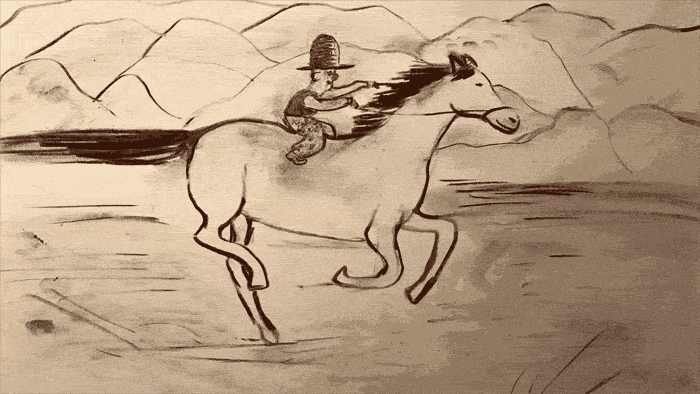
That’s all folks!

Content © Peter Elliott and Kitty Crowther. Post edited by dPICTUS.
‘Wonderful People’: Lyrics and music by Peter Elliott. Animation by Kitty Crowther and Sam McCullen. Music recorded by Peter Elliott at Constellation 8. Mixed and mastered by Fabrice Lefèvre at Born2Groove studio.
FARWEST
Peter Elliott & Kitty Crowther
Pastel–l’école des loisirs, Belgium, 2018
The weather was beautiful that morning. “I am going hunting,” I announced. As I went out, followed by my dog, Jonas, I greeted Jeff and Jim. It was my very first time hunting and it wasn’t that easy!
Later that day, I returned home, opened the door… and I realised that someone had taken my place!
Jeff said it plainly to me: “Move your feet, lose your seat! There’s no two ways about it!”



























